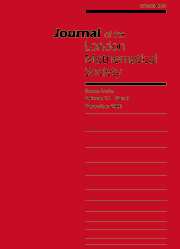No CrossRef data available.
Article contents
ON A QUESTION OF MORDELL AND A SPECTRUM OF LINEAR FORMS
Published online by Cambridge University Press: 19 February 2001
Abstract
Let L1(x), L2(x), …, LN(x) be N real linear forms in N variables defined by
formula here
such that the associated N × N matrix of coefficients C = (cmn) is unimodular. In the classical theory of geometry of numbers, Minkowski's well-known linear forms theorem asserts that for any positive numbers ε1, ε2, …, εN satisfying ε1, ε2, …, εN [ges ] 1, there exists a lattice point p ∈ ℤN, p ≠ 0, such that
formula here
In 1937, Mordell [7] posed the following question which may be viewed, in some sense, as a converse to Minkowski's result. Does there exist a constant ΔN such that for each N × N unimodular real matrix C, there exist positive real numbers ε1, ε2, …, εN satisfying
formula here
such that the only integer solution to the inequalities of (1.1) is p = 0? Moreover, if ΔN does exist, what is the best possible value for ΔN, that is, what is the supremum of all such admissible values of ΔN? Clearly, by Minkowski's theorem, if ΔN exists, then ΔN < 1.
- Type
- Research Article
- Information
- Copyright
- The London Mathematical Society 2000


